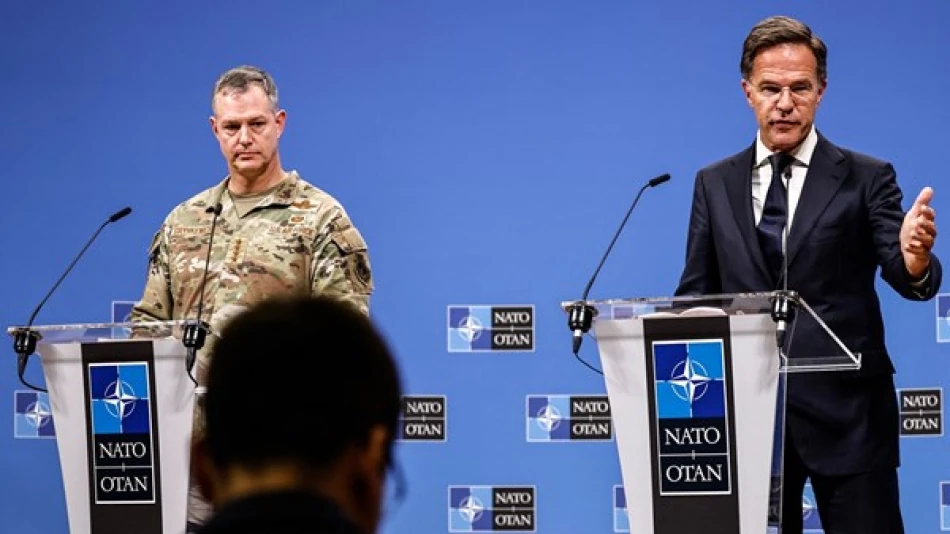
NATO Vows to Bolster Eastern Flank Defenses Amid Regional Tensions
NATO Launches "Eastern Guardian" Operation After Unprecedented Drone Incursion into Polish Airspace
NATO has activated a new defensive operation along its eastern flank following an alarming breach of Polish airspace by nearly 20 drones this week—marking the first such large-scale violation since the alliance's founding in 1949. The move signals a significant escalation in NATO's defensive posture and reflects growing concerns about the vulnerability of member states' borders in an era of hybrid warfare.
Immediate Military Response
NATO Secretary-General Mark Rutte announced Friday that the alliance would launch "Eastern Guardian," a targeted operation to strengthen defenses along its most exposed frontier. The operation, ordered by General Christopher Cavoli, NATO's Supreme Allied Commander Europe, will begin "in the coming days" with contributions from multiple alliance members.
France is deploying three Rafale fighter jets to reinforce Polish airspace defense, while Germany has also committed to bolstering aerial protection. Denmark and the United Kingdom are among other nations contributing to the operation, though specific details of their involvement remain classified.
Unprecedented Scale of Violation
The Tuesday-Wednesday incident saw 19 drones penetrate Polish airspace, with Polish and Dutch F-16 and F-35 fighters successfully intercepting at least three. The scale and coordination of this breach represents a new threshold in testing NATO's eastern defenses, far exceeding previous isolated incidents.
Strategic Implications for NATO's Eastern Flank
The "Eastern Guardian" operation represents more than a reactive measure—it signals a fundamental shift in how NATO approaches border security in the drone age. Unlike traditional aircraft violations, drone swarms present unique challenges: they're harder to detect, cheaper to deploy, and can overwhelm conventional air defense systems through sheer numbers.
Testing Alliance Resolve
While NATO officials remain diplomatically cautious about attributing intent, the timing and scale suggest a deliberate probe of alliance capabilities and response times. General Cavoli emphasized that regardless of whether the incursion was intentional, "it was dangerous and unacceptable."
This incident echoes similar testing patterns seen before major military escalations, where adversaries probe defensive gaps and measure response capabilities. The coordinated nature of nearly 20 drones suggests sophisticated planning rather than accidental drift.
Broader Context of Hybrid Warfare
The drone incursion fits within a broader pattern of hybrid warfare tactics that blur the lines between peace and conflict. Unlike conventional military threats, drone swarms can be deployed with plausible deniability while gathering intelligence on defensive capabilities and response protocols.
Lessons from Other Conflicts
Recent conflicts have demonstrated drones' effectiveness in overwhelming traditional air defenses. The relatively low cost of drone technology compared to interceptor missiles creates an asymmetric challenge—defenders must expend expensive resources to counter cheap, expendable threats.
NATO's response suggests the alliance recognizes this new reality and is adapting its defensive posture accordingly. The "Eastern Guardian" operation likely includes enhanced radar coverage, rapid-response protocols, and possibly electronic warfare capabilities specifically designed to counter drone swarms.
Long-term Implications for European Security
This incident may mark a turning point in how NATO approaches eastern European defense. The deployment of advanced fighters like the Rafale specifically for airspace protection suggests a more permanent enhancement of defensive capabilities rather than a temporary response.
For European defense planning, the incident underscores the need for integrated air defense systems capable of handling both traditional aircraft and emerging drone threats. The multi-national response also demonstrates NATO's commitment to collective defense principles, with Western European nations immediately supporting their eastern allies.
The ongoing assessment of this "unprecedented" violation will likely influence NATO's strategic planning for years to come, potentially accelerating investments in anti-drone technologies and reshaping defensive deployments along the alliance's most vulnerable borders.
Most Viewed News

 Layla Al Mansoori
Layla Al Mansoori






